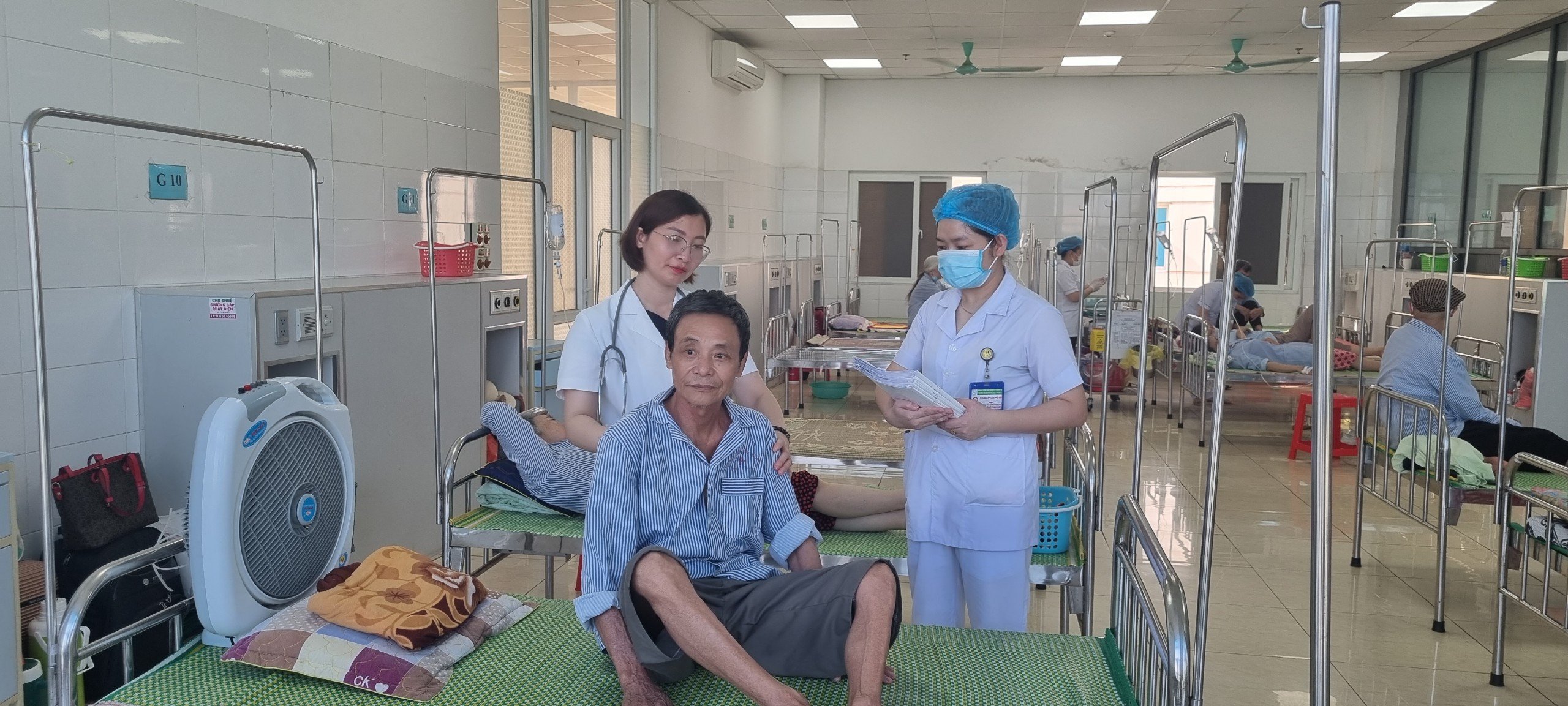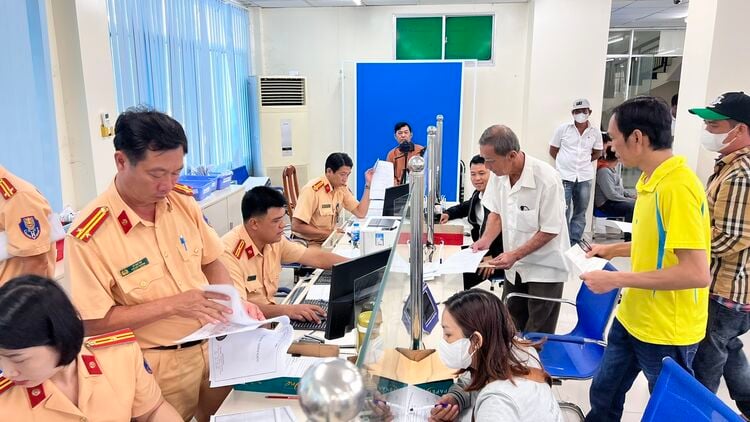In recent years, palliative care for terminal cancer patients has always been a top priority at Thanh Hoa Oncology Hospital. Palliative care is provided from the time the disease is first detected to the treatment process, to help patients stabilize their psychology, improve their health and feel most comfortable in their final days.
Patient care at the Intensive Care and Palliative Care Department of Thanh Hoa Oncology Hospital.
The Department of Intensive Care and Palliative Care, Thanh Hoa Oncology Hospital receives an average of 10 to 25 patients per day. Most of them are terminal cancer patients, no longer indicated for surgery, radiation therapy, chemotherapy, etc.
At this stage, the patient must endure increasing pain, severe physical exhaustion, and mental breakdown after a long period of fighting the disease. At this time, palliative treatment is like the last “lifebuoy” that adds life, a “spiritual support” that helps the patient have a more comfortable psychological state, reduces pain, improves health and living conditions, thereby improving the patient’s quality of life.
Patient Tran Thi Hong Thai (38 years old, in Ha Trung district) has late-stage colon cancer. Over the past 10 years, she has undergone many surgeries and chemotherapy, the tumor has metastasized to many other parts of the body, she and her family have given up many times. But since 2021, she has been treated at the Department of Intensive Care and Palliative Care, where she has been consulted, cared for, and encouraged by doctors in terms of nutrition, chemotherapy, and combined with targeted drugs... currently her health is temporarily stable.
Ms. Thai confided: “For us, the disease was in its late stages, like the last station of a train. When we came here for treatment, what we wanted most was to receive care, advice and sharing from the doctors to help myself and all other patients being treated here feel more secure in their final days... and the Department of Intensive Care and Palliative Care has met that need.”
It can be said that the process of cancer treatment such as surgery, radiation therapy, chemotherapy often causes pain to the patient, or pain due to the tumor pressing on the tissues surrounding the tumor; pain due to testing and diagnostic procedures;... if this condition persists, it will cause the patient to collapse both physically and mentally, leading to a gradual loss of will to fight the disease. Therefore, along with direct treatment methods, palliative care is very important, helping patients control pain and other anxiety-causing symptoms. In addition, when patients come for treatment here, doctors and nurses will also guide the patient's family through exercises and psychological relief to help patients and their families overcome difficulties....
The Department of Intensive Care and Palliative Care was established in 2017. This is the first resuscitation and palliative care unit dedicated to terminal cancer patients in Thanh Hoa province. With 65 beds divided into 2 areas: Intensive Care and Palliative Care. Over the years, the department has mastered and applied many new and advanced techniques in diagnosis, treatment, emergency resuscitation, and palliative care for severe and critical patients such as: invasive and non-invasive ventilation, pleural, pericardial, and peritoneal puncture, intravenous chemotherapy, targeted drug therapy, etc., bringing high efficiency to patients.
Master, Doctor Hoang Thi Ha, Head of the Department of Intensive Care and Palliative Care, said that palliative treatment for cancer patients is a process that begins from the time of diagnosis until the patient passes away. In the final stage, cancer cells grow very strongly, spread and invade surrounding areas, metastasize to the vascular system, lymph nodes and internal organs such as the brain, lungs, liver, bones, etc., causing the patient to become exhausted, in a lot of pain and gradually increasing, mentally depressed, reduced resistance, etc., even facing the risk of death due to: respiratory failure, circulatory failure, infection. Currently, based on the physical condition and disease progression of each patient, we will choose appropriate treatment methods such as: controlling respiratory and circulatory functions, providing nutrition, improving physical strength, etc. to help patients improve their quality of life, have the best health and mental state to live fully and peacefully until the last moment.
For the staff of the department, witnessing patients miraculously recover after a critical illness, even a short life, is something to cherish. The satisfaction, peace of mind and trust of patients and their families during their treatment days at the hospital is the motivation for each doctor to overcome all difficulties and hardships, improve their expertise and continue to dedicate themselves to the journey of palliative care, adding strength, bringing love and faith for patients to fight the disease with resilience.
To have a stable and developing Department of Intensive Care and Palliative Care that builds trust for people inside and outside the province as it is today is a process of striving, persistent efforts to overcome difficulties, perfecting medical ethics, expertise every day, every hour of each individual doctor and medical staff. Master, Doctor Nguyen Van Tu, Head of General Planning Department, Thanh Hoa Oncology Hospital said: The Department of Intensive Care and Palliative Care is the key department of the Hospital, where patients with severe cancer are treated. Since its establishment, under the professional guidance of Doctor Hoang Thi Ha and the consensus of doctors and nurses in the Department, the Department of Intensive Care and Palliative Care has focused on developing human resources, professional qualifications, developing high technology, and at the same time focusing on training its staff in communication and behavior so that patients feel trusted, cared for, loved, especially in the last days of their lives. To promote the effectiveness of palliative care for cancer patients, the Hospital will deploy more comprehensive care for patients, specifically sending a team to study at central hospitals to improve professional qualifications and gradually reduce the burden of illness for patients and their families.
In Vietnam, 70-80% of cancer patients come to the hospital when the disease is in the late stages, so the ability to treat is limited and the cost is very expensive. Therefore, doctors recommend that people should have regular health check-ups every 6 months at reputable medical facilities to screen, detect, and have early treatment for all types of cancer.
Xuan Nguyen (CDC Thanh Hoa)
Source



![[Photo] Overcoming all difficulties, speeding up construction progress of Hoa Binh Hydropower Plant Expansion Project](https://vstatic.vietnam.vn/vietnam/resource/IMAGE/2025/4/12/bff04b551e98484c84d74c8faa3526e0)
![[Photo] Closing of the 11th Conference of the 13th Central Committee of the Communist Party of Vietnam](https://vstatic.vietnam.vn/vietnam/resource/IMAGE/2025/4/12/114b57fe6e9b4814a5ddfacf6dfe5b7f)




























































































Comment (0)